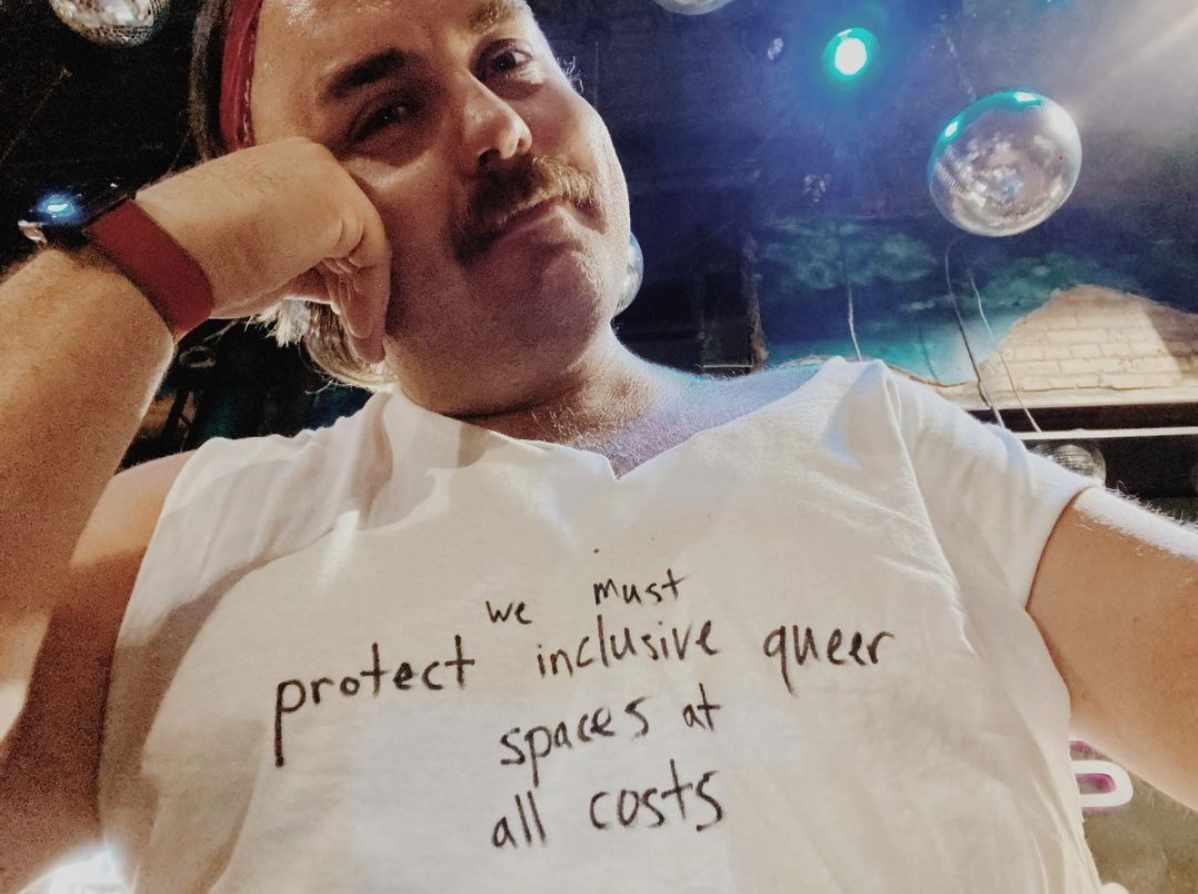Spencer Retelle is used to being in the spotlight. Just… not like this.
You might know the local drag performer by their stage name, The Other Jeannie Retelle. Retelle does drag at the longstanding downtown gay bar the Saloon and cohosts the America’s Next Top Model podcast Standards of Beauty. He’s a member of the performance art group Queerdo Minneapolis.
But last month, eyes were on Retelle for a different reason entirely. Owners at the Saloon, where he’s a barback in addition to a drag performer, had wondered aloud whether some body types—specifically, his body type—belong behind the bar.
The story begins in August, at the bar’s monthly meeting between Saloon ownership and managers. While it was unclear what exactly unfolded during their conversation, rumors started spreading after both managers walked out.
“There was a lot of speculation at first about what was said or what happened, but it was all sort of hush-hush,” Retelle tells Racket.
At an all-staff meeting that followed, Retelle says owner John Moore apologized for the incident and answered some questions, but it still wasn’t clear exactly what was said. Eventually, it came out that one of the Saloon’s owners suggested a staff member’s body was not the desirable image for the gay bar to project. He’d been asked by a guest why Saloon had certain people working behind the bar.
Retelle started piecing things together. People were acting oddly towards him. He wears a lot of crop tops at work—“everyone is usually shirtless at some point in the night, because it gets so fucking hot in that bar.” And his friends were the ones who seemed the most upset.
So he approached the owners.
“I said, ‘Was it me?’ I just straight-up asked,” Retelle says. “And [Moore's] face went even whiter than it already is.”
A town hall-style conversation for community members followed. With around 150 people in attendance, Retelle shared a statement with the owners, which you can read in full here.
“I want to congratulate you both,” the statement begins. “You have both done so much for the queer community in the last 45 years at the Saloon, and I know your heart has been panging with nostalgia for this bar to be like it was when you built it. Well… I’m here to say that you did it. In one manager meeting, in less than 30 minutes, you successfully brought this space back 50 years.”
“I basically thanked the stage for not buckling under my fat body,” Retelle says. “And then I straight up asked them why I should work for them still.”
Later that night, Retelle shared the statement on Instagram and Facebook, along with some photos of the shirt he wore to the meeting. “Too fat for a crop top,” he scrawled in Sharpie on the front. On the back: “This is the only thing that fits me right now.”
By the time he got up the next morning, the posts had taken off.
“I could not believe it when I woke up,” Retelle says. “I just was like, I need to claim this. I knew for my own sanity and my own mental health that if I didn't get ahead of it there would be things said about the situation, and therefore more about my body.”
“I live in Los Angeles, have been to many drag brunches, and can confidently say you are my favorite queen I’ve seen perform,” one commenter notes. “The only size I saw was in your stage presence, which filled the room!”
“You are beautiful and talented and loveable and incredible and the main reason why I'll feel a little more comfortable next time I step foot in the Saloon,” says another.
Adds yet another: “As a patron without a voice I appreciate yours so much and trust you guys will make it happen.”
The “it,” in this case, is working to make the Saloon a space that’s inclusive for everyone.
“This is about my body directly, but on the flip side it’s also about making sure that all bodies feel welcome at the Saloon,” Retelle says. “There’s a lot of grievances with people that are femme or AFAB or also fat—people who have not felt welcome in that space.”
To his point, Ja’mon Kimbrough, a local writer, DJ, and organizer who is Black, tweeted that when he was approached to facilitate a town hall about BIPOC inclusivity in the queer community last year, the situation quickly went south, and he “became public enemy number one.”
“It was just a lot of attacks telling me to go out and exercise more, maybe I won’t be so angry,” Kimbrough tells Racket. “That maybe if I lost some weight and quit carrying around all the negativity I’d feel better.”
He’s happy the conversation is happening now, but it’s hard not for him to feel slighted “when Black people like myself have been crucified for preaching about the same inequalities.”
Prior to the town hall, Saloon’s owners posted an apology video in which they addressed the fallout and admitted to being out of touch. They announced that they’d be stepping back, focusing on making the bar financially stable. There’s been a managerial shuffle, and new manager Bobby Palmer tells us, “I support Spencer completely.”
“I think the biggest thing to point out is that there’s a very clear separation between the owners and a lot of the staff, and that what they said was not in any way representative of the opinions of anyone who actually works there,” says Palmer, who’s worked at the bar for eight years. He says it’s the goal of the management team to create a space “that’s as inclusive as possible.”
One of Retelle’s questions for Saloon ownership was whether their cornerstone gay bar is a queer space or just a gay bar. Who is really welcome? In that Facebook video and in conversations with the staff, the owners affirmed that it is a queer space, and they’ve ask for input and involvement from customers in making it queer and inclusive.
Asked whether that’s what he wants too—if he hopes people will show up or prefers they spend their money elsewhere—Retelle says that’s been a tough question to answer.
“That’s sort of been the hardest thing, because I think people want me to say that you should boycott the Saloon,” he says. “But we the people that work there, we the patrons there, we are the Saloon. The Saloon is not the two old, male owners. That’s why I want people to keep showing up.”
“To me, the best form of support is to still show up to the bar and take up space if you don’t think you belong here taking up space.”






